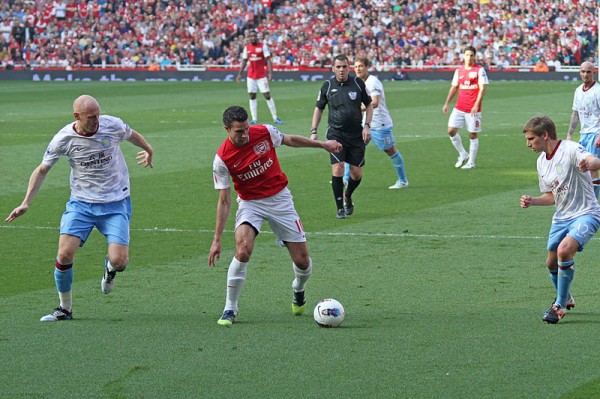
(credit: Ronnie Macdonald, Creative Commons)
Being a referee is never easy.
In the latest wrangle between SingTel and StarHub for English Premier League TV rights, the Media Development Authority (MDA) has found itself exactly in that tight spot.
But unlike a match where at least one set of fans will be pleased, a bad call by the officials here will have serious impact beyond just football rights. It will drastically drag back Singapore’s pay-TV industry, just as it is showing signs of opening up.
At the heart of the problem is how SingTel had negotiated for the right to broadcast live Premier League matches for the next three seasons.
It has done a “non exclusive” deal with the rights owners, which on paper should mean that rival StarHub should be able to sign a separate deal. In other words, football fans can watch matches on either set-top box.
Yet, that does not seem to be happening. Since October, when the “red” camp surprised everyone with its deal, StarHub has been unsuccessfully trying to talk to the Football Association Premier League.
It says it has been rebuffed, because the rights owners are in an “exclusive” negotiation period with SingTel. The “green” camp has gone further in recent weeks, alleging that SingTel has a condition in place where the premier league has to pay SingTel a “rebate” if it decided to sign on with another pay-TV operator.
SingTel has not addressed this “rebate” directly, citing the confidentiality of its agreement, but did argue that it had not prevented StarHub from signing a separate deal. The truth of that is what the authorities have to find out.
First, why was there an exclusive negotiation period when the deal was non-exclusive? Second, what exactly is the deal that SingTel has signed and does it come with any conditions to delay or prevent rivals from signing up?
Those questions are important because they set an example for future negotiations. If a pay-TV operator can find a way to sign a “non-exclusive” deal yet insert a clause in the contract to “penalise” or make it extremely hard for a rival to sign up, then it has found a loophole in the MDA’s rules.
These so-called cross-carriage rules, set up as Singapore almost missed out on watching the last World Cup, mean that a pay-TV operator has to show its exclusive programmes on a rival’s set-top box.
That was what happened for Euro 2012, when StarHub got the rights for the live matches and showed them on SingTel’s mio TV service. Separately, when channels such as National Geographic stopped being exclusive on StarHub, SingTel went in and grabbed the rights for its own TV lineup.
Sadly, that may have been a false dawn for viewers hoping for more common channels on either set-top box. The wheeling and dealing that is happening for the English Premier League rights now could signal a return to the dark days.
SingTel will feel that it has the momentum now, six years after it entered the fray to challenge StarHub’s cable TV service. It had 398,000 pay-TV subscribers at the end of 2012, while StarHub had 536,000, or 9,000 fewer than a year ago, in the first decline since beginning operations 20 years ago.
But you can be sure StarHub won’t be sitting idle. It might hit back by tying up other content providers in a “non exclusive” way, like how SingTel has done with the football rights.
Maybe this will be for Wimbledon. Or, perhaps for non-sports programmes. Either way, if StarHub and SingTel start playing the kind of game they used to, the same problems return: the bidding up of content prices and costs being passed on to viewers. Back to square one.
For the authorities, the way out of the situation is to make sure that everything is always done above board. They have set the rules, but the rules have to be updated if they are found wanting.
Here’s an example. Several years ago, when that mega-million-dollar fibre optic network was still on the drawing board, the Infocomm Development Authority proposed a new ruling that any other separate, private network built by anyone else (hint: SingTel) would also have to play by the same rules.
The reason? So that SingTel could not keep the same dominant position, even if it decided to build a separate national fibre network on its own. SingTel eventually joined the national project.
The same kind of tough rule-making may be necessary from MDA this time. If there is any unfair advantage that SingTel has got with its non-exclusive deal, the regulator has to flag it and remedy the situation.
How can MDA change a commercial deal? No, it cannot, but it can deem the deal an exclusive deal if it looks like and smells like one. That will be a signal to other content owners not to look for loopholes to bypass the rules.
Conversely, if SingTel’s deal is fine, MDA should rule in SingTel’s favour and basically tell StarHub to just pay up for the rights. What the referee cannot do is wash its hands of the situation, or delay things until they are too late to be changed.
That’s telling the industry it’s taking one step forward, two steps back.







Singtel Mio only exists for the EPL and other exclusive sports rights. They charge these monopoly prices to the bars, coffeeshops. I know these runs in the 10s of thousands if there are a few tv sets.
Starhub should come in and totally murder Mio. Mio should just die a jarring death. They offer nothing else.
I can’t wait for Starhub to acquire the rights to the EPL.
The MioTV set-top box is a big failure, always hanging!!
Fans should, as what the British would say, tell EPL to sod off with their wallets!
Or fans could just stop watching. That will be one way to send a signal.